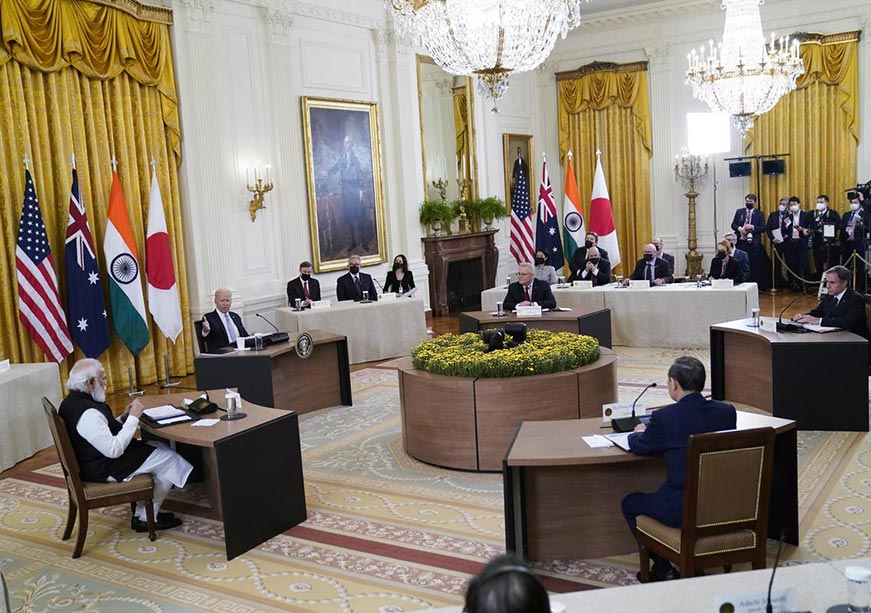-
CENTRES
Progammes & Centres
Location
The fourth Quad Leaders’ Summit will be an opportunity to assess its progress in ensuring a peaceful and stable Indo-Pacific

After much anticipation, the leaders of the Quad (Australia, India, Japan and the United States) will convene for their fourth summit in Wilmington, Delaware, U.S., on September 21. This meeting marks a full circle since the first in-person Quad Leaders’ Summit hosted by U.S. President Joe Biden in 2021, symbolising the steady evolution of this strategic partnership. The summit takes place against a backdrop of pressing global challenges and transitions in leadership among some member-nations, set on the sidelines of the United Nations General Assembly (UNGA) and the United Nations Summit of the Future.
The meeting holds immediate significance, especially considering past postponements of Quad summits at the highest level. Both Mr. Biden and Japan’s Prime Minister Fumio Kishida are facing leadership transitions; Mr. Biden has announced that he will not seek re-election, and Mr. Kishida’s Liberal Democratic Party is facing potential defeat in Japan. These impending changes underscore the urgency to consolidate the Quad’s strategic direction and commitments before new leadership dynamics emerge.
India, originally slated to host this year’s summit, graciously deferred to the U.S., and will now host the next meeting. This decision aligns with practical considerations for Mr. Biden, who, amid a busy election cycle, may have found it challenging to make another international visit following his recent trip to India for the G-20 summit.
One of the primary goals of this summit will be to reinforce the Quad’s framework on maritime domain awareness (MDA), which has become increasingly critical in linking regional security, supply chains, infrastructure, and technology initiatives. During their last meeting in July 2024 in Tokyo, the Quad Foreign Ministers announced the expansion of the Indo-Pacific Partnership for Maritime Domain Awareness (IPMDA) to the Indian Ocean region, reflecting a strategic effort to integrate this vast expanse into the broader Indo-Pacific narrative. This initiative aims to standardise regional laws and enhance accountability for violations of international maritime norms, thus promoting a rules-based order further.
The Quad Foreign Ministers announced the expansion of the Indo-Pacific Partnership for Maritime Domain Awareness (IPMDA) to the Indian Ocean region, reflecting a strategic effort to integrate this vast expanse into the broader Indo-Pacific narrative.
The July meeting also highlighted the importance of the United Nations Convention on the Law of the Sea (UNCLOS) as the foundation for freedom of navigation and operational abilities of nations. With this in mind, the Wilmington summit is expected to further explore the potential launch of the Quad Maritime Legal Dialogue under the Quad Maritime Security Working Group which seeks to consolidate expertise in international maritime law, providing robust legal frameworks that could serve not only the Quad nations but also other countries in the region.
A key focus will be the operationalisation of the South Asia programme through the Information Fusion Centre-Indian Ocean Region (IFC-IOR) based in India. This step signals India’s expanding role in the MDA and its commitment to maintaining a free and open Indo-Pacific by facilitating real-time information sharing with like-minded partners. The IFC-IOR, which currently hosts 12 International Liaison Officers, represents a growing coalition of nations dedicated to upholding freedom of navigation and a rules-based maritime order.
The Quad’s expansive agenda, spread across 16 working groups, reflects its ambition to address a wide array of critical issues that include climate change, critical and emerging technologies, infrastructure and connectivity, health, humanitarian assistance, disaster relief, maritime security, and counterterrorism. The Wilmington summit presents an opportunity for the leaders to assess progress on these fronts and commit to new initiatives. Among the key developments on the agenda will be reviewing the implementation of the Open-Radio Access Network (RAN) network in Palau, the deployment of a space-based climate warning system in Mauritius, the advancement of off-grid solar projects in the Indo-Pacific islands, and the outcomes of the inaugural Quad science, technology, engineering, and mathematics (STEM) cohort.
The Wilmington summit presents an opportunity for the leaders to assess progress on these fronts and commit to new initiatives.
The Quad is evolving rapidly as a benchmark framework for ensuring a peaceful and stable Indo-Pacific, particularly in light of the shifting geopolitical landscape. As regional supply chains and infrastructure networks adapt, the Quad senses an opportunity to play a crucial role in regional security. This is especially pertinent as threats from hostile actors across the Indo-Pacific have increased amid ongoing conflicts in West Asia, the Russia-Ukraine war, and a fracturing world order. China’s assertive behaviour, often outside accepted international norms, has compounded the region’s security challenges, highlighting the need for a unified and proactive Quad response. Besides, the reconfiguration of global supply chains away from China has underscored the imperative of regional economic resilience and de-risking strategies. For the Quad, this shifting dynamic presents a unique opportunity for regional economic growth while simultaneously enhancing security through diversified and resilient supply chains.
The Quad summit in Wilmington also serves as a prelude to the inaugural Summit of the Future, which aims to reshape global governance by addressing critical issues such as sustainable development, international peace and security, technological innovation, and the welfare of future generations. In many respects, the Quad already acts as a regional microcosm of these broader global aspirations, championing cooperation and stability in the Indo-Pacific.
As the Quad continues to mature, this summit could be a pivotal moment to assess its progress stacked against global aspirational metrics on similar issues, perhaps allowing the Quad to lay the groundwork for future initiatives.
This commentary originally appeared in The Hindu.
The views expressed above belong to the author(s). ORF research and analyses now available on Telegram! Click here to access our curated content — blogs, longforms and interviews.

Professor Harsh V. Pant is Vice President – Studies and Foreign Policy at Observer Research Foundation, New Delhi. He is a Professor of International Relations ...
Read More +
Vivek Mishra is Deputy Director – Strategic Studies Programme at the Observer Research Foundation. His work focuses on US foreign policy, domestic politics in the US, ...
Read More +